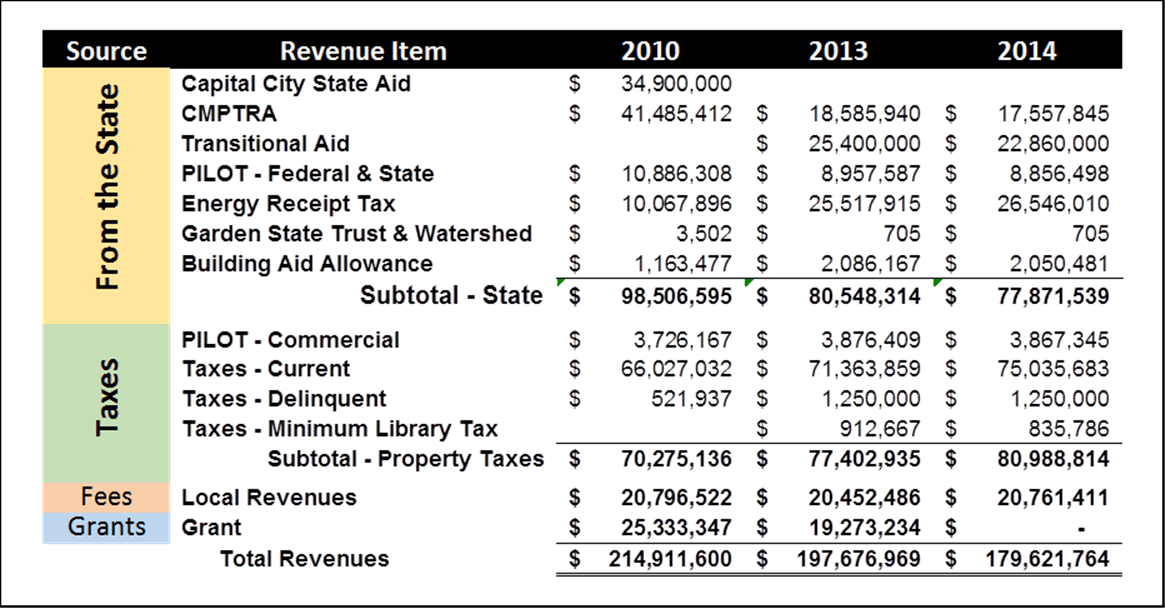What should a Mayor of Trenton ask of New Jersey?
Historically (before Mack and Christie) the state funneled four main sources of revenue to Trenton: Capital City Aid, CMPTRA, PILOTs on State Buildings and Energy Tax Receipts.
Two of those sources, CMPTRA and Energy Tax Receipts, are meant to be pass-through payments the state collects from corporations on behalf of every city in NJ. CMPTRA includes business taxes (but in the case of Trenton also included some ill-defined PILOT payments). Energy Tax Receipts are paid from utility company fees. It turns out that the State has been shortchanging cities across NJ for many years in both of these revenue streams. Neither of them have transparent funding formulas. The NJ League of Municipalities has taken the State to task over this but Trenton has been silent up until now. Support for A-2753 to end diversion of Energy Tax Receipts is especially important.
There is no very accurate measure of the level that we have been shortchanged but experts in Trenton estimate the amount to be in the millions. The next Mayor of Trenton will add his voice to those of other municipalities in formulating a better mechanism for transferring the money that rightly belongs to the cities.
The State discontinued the Capital City State Aid program in 2011. It was essentially replaced with Transitional Aid though, at a lessor amount as you can see in the revenue charts below. Capital City State Aid was a very undependable source of funding because it had no formula and was supplied through a yearly act of Legislation. Obviously this Governor has decided that this outright grant is untenable. I agree with him.
Transitional Aid was meant to be transitional, a gradual decrease in State funding with a lot of conditions monitored by the Dept. of Community Affairs (DCA) but really, the State wanted a plan to revitalize the city, a plan that it never got. All of us in Trenton are aware of how that has gone under the Mack administration. Because DCA and the Governor couldn’t trust our former Mayor, funding was cut and the restrictions became tighter.
The final form of funding is what’s most important for our future relationship with New Jersey. Several State owned buildings in Trenton have had negotiated PILOTs with the City. There is no rhyme or reason to this other than it was a mechanism in which to transfer additional funding to the City for various reasons. Only a handful of State buildings have PILOTs. The total amount comes out to about $9M. This is an ad hoc approach to funding.
No State in the U.S. has any obligation to pay a City anything. Governments can’t tax each other. However, many States understand that especially in Capital cities the state is a major property owner and employer and must behave more like a corporate landowner. I propose that we formalize this approach through negotiation and State legislation to generate a funding PILOT based on either the assessed value of State land in Trenton or the proportion of land owned by the State. The Fix Trenton’s Budget group has analyzed this issue by examining the city’s tax rolls and report that the State of NJ owns roughly 19% of all property value in Trenton. However, we have reason to believe these values are under-assessed by quite a bit (perhaps 50%). Additionally, the State owns about 28% of the acreage in the City.
The question is, if the State were taxed like a corporation, what would it pay?
Let’s say that after a reassessment the State is found to own 30% of the land and property value. Total values in Trenton are roughly $4B. Our current tax rate is 3.85%. Therefore the State could theoretically pay 30% X $4B X 3.85% = $46.2M. This is more than it pays today in Transitional Aid and PILOTs (roughly $32M) but less than it did in 2010. This is a good formula.
Trenton is in a dire situation though and we do need the State of NJ’s help in recovering from this. Our next Mayor will do well to ask for State assistance in many areas mainly around legislative relief to overhaul our tax system and create incentives to invest in Trenton. In the meantime we will request that Transitional Aid be maintained until our economic plans can begin to bear fruit, likely 4-5 years.
Jim Golden’s Trenton Forward plan is unique in that it includes a detailed plan to revitalize the city that specifically seeks to rid us of the need for transitional aid as long as our funding formulas can be formalized. The BIG goal in that plan is to make Trenton much more self-sufficient. Our lack of self-sufficiency puts us all at risk because our budgets will be uncertain. We’re entirely too dependent on the whims of a Governor or Legislature.
Trenton Revenue Source Comparison

Source: Trenton City Budgets, Fix Trenton’s Budget.
Trenton Forward “Asks” to New Jersey: Beyond the Funding Formulas
- Support for consulting project to define and implement Best in Breed
- Seek a Land Value Tax capability to replace PILOTs and Vacant property registration fees
- Allocate $50M to a Residential Investment subsidy over 10 years
- Enact enabling legislation for Income Tax Credit Zone that caps state income taxes in Trenton
- Continued funding for temporary police assistance







